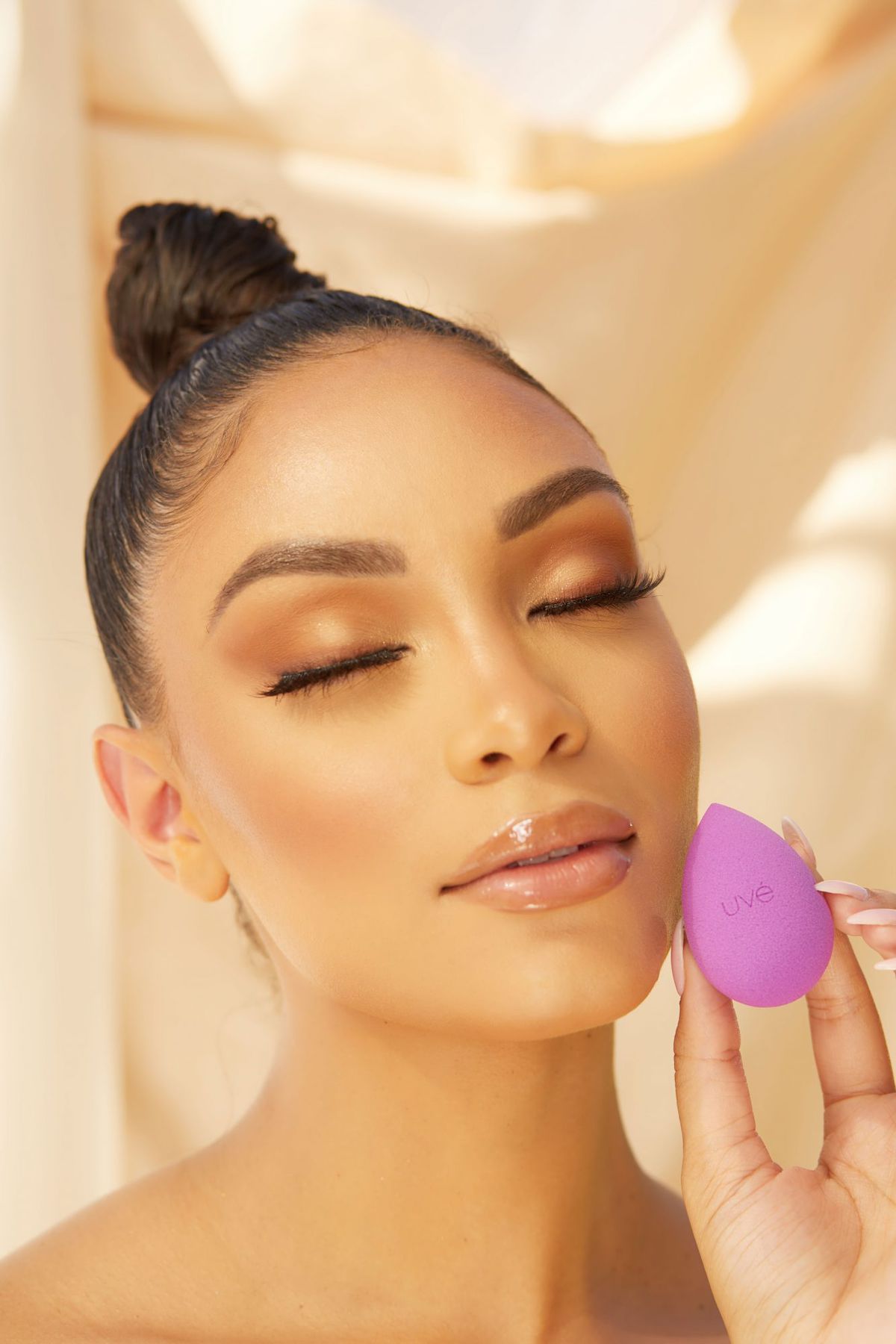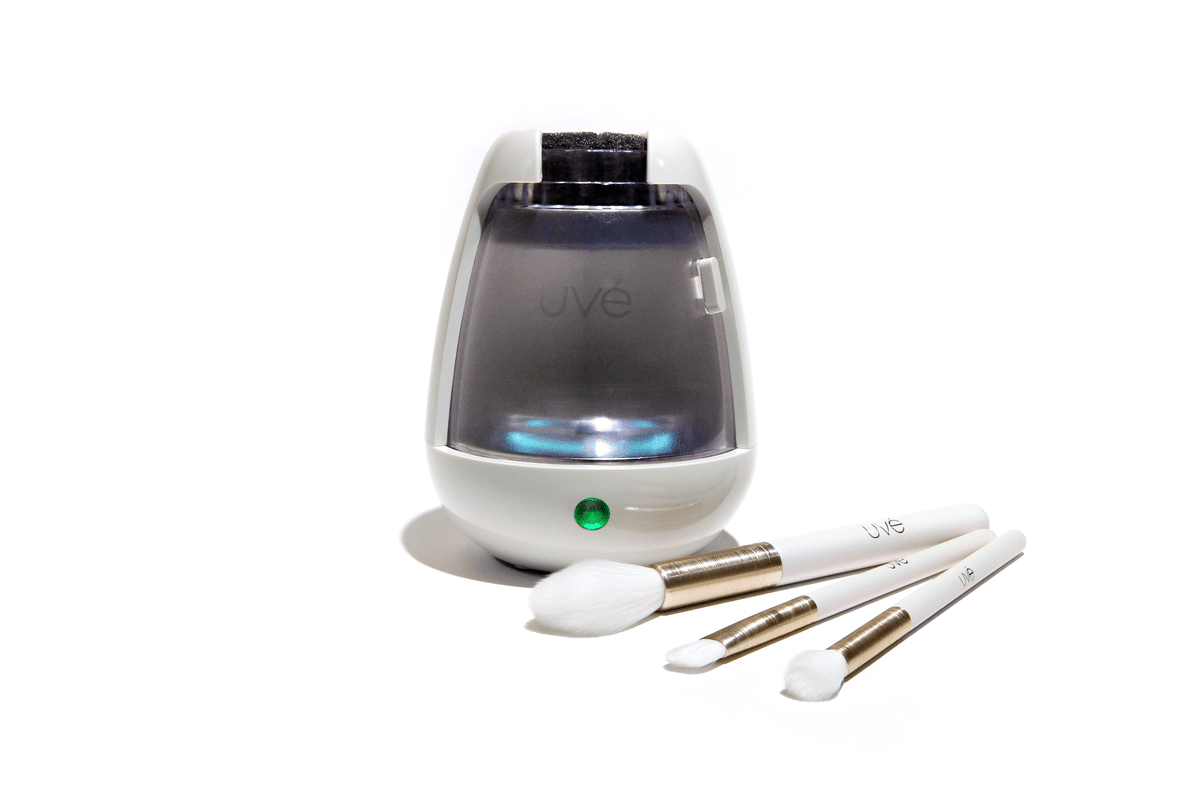Should You Be Using Anti-Microbial Makeup Tools?
Remember back in March 2020 when we thought COVID-19 would just be, you know, a two week thing — maybe?
Well, almost a year later, here we are. Still at home, still wearing masks, and Lysol wipes are still out of stock. Oh, and we're also still being extra diligent about hygiene, which brings me to my next point: our makeup tools should be cleaned thoroughly, too.
Sure, most of us are probably taking a break from doing a full face every day, but with the new coronavirus variant already in the U.S., you can never be too careful. Plus, regardless of COVID, using germ-ridden brushes and sponges is never a good idea. That's why when UVé launched its anti-microbial makeup tools in Nov. 2020, my ears perked up.
Here, I spoke with board-certified dermatologist Dr. Lina Kennedy as well as Romina Hashemizadeh, B.S., microbiology and consultant R&D scientist for UVé to learn more about the science behind these tools, whether or not they can prevent COVID transmission, and their benefits for the skin.
What Effects Will Using Anti-Microbial Makeup Tools Have on the Skin?
Makeup tools on their own have no power when it comes to actual skincare, but making sure that anything that touches your face is clean beforehand can help to prevent breakouts and other issues.
"Using [clean] makeup brushes is important in order to avoid having bacteria grow on the bristles," explains Dr. Kennedy. "The truth is, with every use of your makeup brush, it is collecting oil, dust, dead skin, old makeup, and bacteria. If your brushes are not properly and regularly cleaned, then you can deposit these substances onto your skin and clog your pores. UVé brushes are made to repel bacteria, fungi and even some viruses. This way, these organisms can’t make the bristles their home."
How Do the Tool’s Surfaces Remain Anti-Microbial?
"UVé Beauty’s blender has an anti-microbial solution that is mixed into the manufacturing process," Hashemizadeh explains. "Some of the compounds include silver, zinc, copper, and QAC (or quaternary ammonium compounds). There have been a vast number of studies that show the antimicrobial properties of each of these compounds. For example, the antibacterial activity of silver has been known for a very long time, and has been used in a variety of medicinal and consumer applications. This applies to studies done on zinc and copper as well."
Same goes for the brand's makeup brushes. And when it comes to the UVé Personal UV-C Sterilization System, along with the additives, the tool uses UV-C germicidal light to kill 99.9% of germs.
To shop: $70; uvebeauty.com
However, Hashemizadeh does add that if you have any known allergies to these elements, make sure to check in with a dermatologist before use.
Do These Factors Prevent COVID-19 From Living on the Surface of the Makeup Tools?
Maybe, but the answer is complicated since scientists are still doing research on the virus.
"Just because something is antimicrobial does not mean that a particular microbe will not attach itself to it," says Hashemizadeh. "For something like COVID-19, it is important to default to studies and recommendations made by the CDC."
Currently, the CDC states that "transmission of novel coronavirus to persons from surfaces contaminated with the virus has not been documented." However, there is evidence that COVID-19 can live on surfaces for anywhere between a few hours to a few days.
Another thing to consider is that just because the surface of these tools are anti-microbial, it doesn't mean they're a foolproof option.
"It is very important to wash your hands for at least 20 seconds before using any of your makeup products," the scientist shares. "It is also important to keep makeup tools separate for personal use, and if you are using tools on a friend or on clients, to sanitize before using on a different person."
VIDEO: InStyle Editors on… Post Pandemic Plastic Surgery Boom
If I’m Using Anti-Microbial Makeup Tools, Will I Still Need to Manually Clean Them?
Hell yes! We're not taking any chances with anything in 2021, OK? However, you can get away with spacing out your washes.
"Not every single organism, oil, or dead skin particle will get repelled," says Dr. Kennedy. "Makeup also builds up on your brushes with every use. You won’t be off the hook, but your brushes won’t have to be washed as often."
Source: Read Full Article

